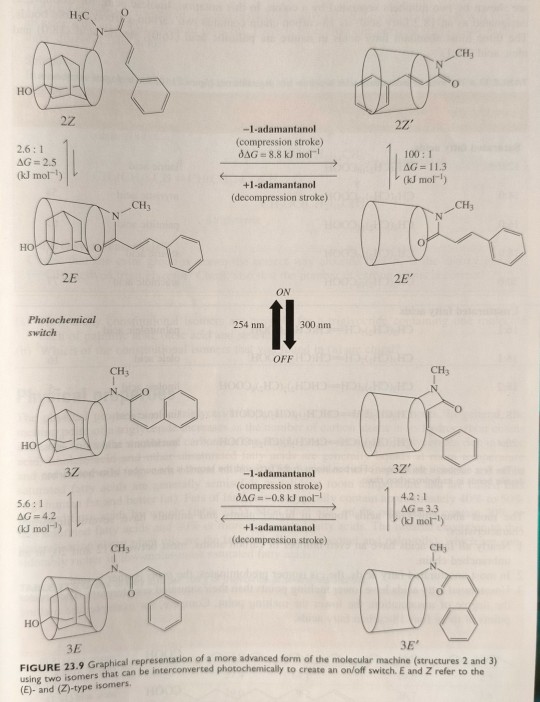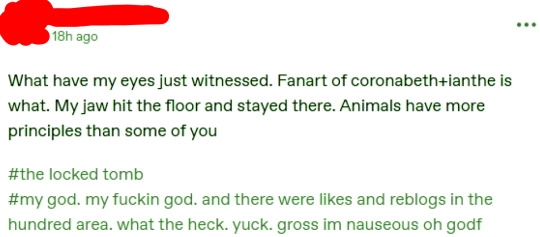#irradiation
Explore tagged Tumblr posts
Text
Irradiation at 300 nm converts the trans cinnamide side chain of structure 2 to the cis isomer of structure 3, while the reverse process occurs at 254 nm.

In this case, however, the orientation of the cis double bond prevents the side chain inserting into the cavity and so in that mode the machine is turned off. By contrast, the trans alkene moiety does allow insertion, and so in this mode the machine is turned on. (...) The photoisomerisation of the trans cinnamide side chain of structure 2 and the cis isomer of structure 3 provides the machine with an on/off switch.
"Chemistry" 2e - Blackman, A., Bottle, S., Schmid, S., Mocerino, M., Wille, U.
#book quote#chemistry#nonfiction#textbook#irradiation#trans#cinnamide#isomer#on off#double bond#alkene#moiety#insertion#nanotechnology#machine#photochemistry#uv light#ultraviolet light
3 notes
·
View notes
Text
Tsuneo Imahori: Irradiation
youtube
For those too punk to put on "Gonna Fly Now" from the Rocky soundtrack when they're doing roadwork, here's the guitar work from the Hajime No Ippo soundtrack. Get ready to Dempsey Roll your opponents or don't even show up in the ring on Sunday night in the Nissan Stadium.
Song Score: 2011/10
1 note
·
View note
Text
Floating in the void My irradiation stumbles On self-vision
#nonhapiupareti 2024




""I am made of the echo of a dying star, its death rattle courses through my veins. I must shine brightly in its stead, so its sacrifice was not in vain."
I got real poetic the other day.
Kind of obsessed that we're made of stars.
Graphics made using the @r4veapp-blog
#void#floating#irradiation#stumbling#astronomy#stars#self#made of stardust#my poetry#philosophy#shower thoughts
3K notes
·
View notes
Text

The Research Notebooks of Satyendra Sunkavally, page 35.
#handwriting#manucsript#cursive#journals#platelets#irradiation#magnesium deficiency#ammonia#benzene#leukemia#hayflick limit#hyperglycemia#diabetes
0 notes
Text
Irradiation of nuclei with radio-frequency radiation of the appropriate energy causes some of those in the lower energy spin state to absorb energy and results in their nuclear spins flipping from the lower energy state to the higher energy state, as illustrated in figure 20.22.

"Chemistry" 2e - Blackman, A., Bottle, S., Schmid, S., Mocerino, M., Wille, U.
#book quotes#chemistry#nonfiction#textbook#irradiation#radio frequency radiation#energy spin#low energy#high energy#nuclear spin#resonance#energy absorption
0 notes
Text
rb if your blog is irradiated
Had a dream I saw blog on tumblr with "irradiated blogs DNI" in the description and when I looked through their posts I discovered there were some blogs with "uranium code" in their css that would expose you to literal radiation if you looked at them.
15K notes
·
View notes
Text
Guess who is being whimsical and radioactive? Uh, not you of course. You're a wimpy creature slobbering in the stable elements with your ??? half lives. 😒
1 note
·
View note
Link
Trust the medical establishment?
#Israel#medical experiments#ringworm#children#irradiation#X-rays#harms#deception#cover-up#misconduct#eugenics
0 notes
Text



0 notes
Text
Polychlorinated biphenyls are very useful chemicals, but also quite toxic to a wide range of living organisms, and when they escape into the environment (inevitable for anything in widespread use), they do not break down. This makes them a hazard which outweighs their usefulness.
Because of their durability, any form of “clean-up” which involves moving contaminated material somewhere else and burying it only deals with the problem temporarily. Therefore some means of destroying them is required.
There are at least two ways known to safely dispose of PCBs. One is to contact them against liquid sodium. The resultant reaction de-chlorinates the organic compound, producing common salt and hydrocarbons. Obviously, however, this only works if the PCBs are in a relatively pure form. If they can be filtered out of water using reverse osmosis, or removed from dirt by distillation with steam, this may be a viable route.
When there are large quantities of slightly-contaminated material involved, an alternative is the use of strong ionizing radiation, which can break the strong covalent bonds, degrading the highly-stable PCBs into more reactive chemical species. These reactive species, in turn, may still be toxic, but can be neutralized and broken down by chemical and biological processes. The difficulty is finding a radiation source of sufficient strength, in sufficient quantity, and at sufficiently low cost for the bulk treatment of contaminated material.
One possibility is freshly-discharged fuel from nuclear power reactors. Spent fuel in storage ponds has been used as a radiation source in tests (for instance, to polymerize rubber), but current regulations would make it very difficult to bring large numbers of drums of contaminated dirt in and out of the fuel pools for this purpose.
We will take a moment to contrast the situation with PCBs against that with the fission-product wastes of the nuclear fuel cycle. Fission products are handled in modest quantities (supplying the whole of present world energy demand from fission would generate seven thousand tonnes a year), and handled in specialized industrial facilities, so the risk of their escaping to the environment is small. If they do escape, they are very easy to track, with cheap handheld instruments that can detect their beta-gamma radiation at a thousand times below the danger level ; and the very characteristic that makes them hazardous also means that they are constantly removing themselves from existence.
2K notes
·
View notes
Text
A key breakthrough in the history of phytochrome was the discovery that the effects of red light (620-700 nm) could be reversed by a subsequent irradiation with far-red light (710-850 nm).
"Plant Physiology and Development" int'l 6e - Taiz, L., Zeiger, E., Møller, I.M., Murphy, A.
#book quote#plant physiology and development#nonfiction#textbook#phytochrome#breakthrough#red light#far red light#irradiation#reversal
1 note
·
View note
Text
Aabria: lair action
Jasper: oh, it's okay
Aabria: huh?
Jasper: it's okay, you don't have to do that
Aabria: I don't have to?
[Brennan laughing]
Izzy: we're good
Siobhan: no, thank you
Aabria: that threw me off so fucking much.
Brennan: the authority of, I was like, like that, whatever that was made me be like [imitating a ear piece call]: Aabria, Jasper says no on that
Aabria: yeah yeah, oh I'm so, can you tell him I'm so sorry--
Erika: it's the accent
Aabria: yeah, fucking British accent cinders authority
Jasper: came from such a deep sense of fear. That was where I was coming from
Siobhan! Yes, exactly, the accent. It comes from a deep sense of fear
Brennan: I've never seen someone who's being faced with death and ruin with a voice of like [calmly]: I'm gonna send this back to the kitchen because this was not very good
#aabria iyengar#dimension 20#burrow's end#ep 10 evolution and revolution#brennan lee mulligan#siobhan thompson#rashawn scott#jasper william cartwright#erika ishii#isabella roland#phoebe's aim of irradiating the earth. yikes!
3K notes
·
View notes
Text


They know and they’re playing with us. I love it
1K notes
·
View notes
Text
They still do something like it, but now it is with cytostatica added to germinating plants. (Cytostatica = Cancer medication used for chemotherapy.).
Cytostatica prevents proper cell division, chromosomal non-disjunction, and most animals are very sensitive to this as our number of chromosomes and genes needs to be correct, or we'll get disorders and infertility. This I why it can be used for cancer.
But plants don't care. You can double or triple the number of chromosomes and they're still going strong and perfectly fertile. Plants are also sluts that'll happily crossbreed with anything possible.
As cytostatica affect cell division, the germinating plants will develop abnormal cells with extra chronosomes or genes as they grow and this affects the adult plant and it's seeds. The most visible effect is usually change of colour and patterns, larger flowers with more petals and larger fruits.
It's called polyploidy.

The n stands for the number of chromosomes in a gamete (sperm og egg cell) on average organisms have 2n in their cell and mammals often will be miscarried if the number is wrong, but as said plants don't care.



Get ready kids, because I’m about to tell you all about gamma gardening!
Basically, after WWII, some people were interested in using fission energy for good. One of the uses they came up with was to create useful genetic mutations in plants.
But unlike today’s careful gene editing, gamma gardens took the “just blast them with radiation and pray that the RNG gods give you something good” approach.
According to Wikipedia, the methodology was as follows:
Gamma gardens were typically five acres in size, and were arranged in a circular pattern with a retractable radiation source in the middle. Plants were usually laid out like slices of a pie, stemming from the central radiation source; this pattern produced a range of radiation doses over the radius from the center. Radioactive bombardment would take place for around twenty hours, after which scientists wearing protective equipment would enter the garden and assess the results. The plants nearest the center usually died, while the ones further out often featured "tumors and other growth abnormalities". Beyond these were the plants of interest, with a higher than usual range of mutations, though not to the damaging extent of those closer to the radiation source. These gamma gardens have continued to operate on largely the same designs as those conceived in the 1950s.
They’ve decreased greatly in popularity as the reputation of radiation has gone down the toilet, but one notable product of gamma gardens is the ‘Ruby Red’ grapefruit!

^ this is a proper Fallout-style mutant
8K notes
·
View notes
Text

this is so fucking funny did this person not read the books. amiguito did you read noina the ninth. what did you think was going on for that whole scene
2K notes
·
View notes
Text


at what point do they let me name it
#inaturalist#naturalist#nature#ecology#zoology#biology#wildlife#i am 52% of all observations. worldwide#AND this is before the split. theyre gonna split it based on geography#i think ill honest to god be over 70% when they do#anyway i vote naming it irradiated jumping spider#this is what i mean when i say im parasocial about this spider. btw
122 notes
·
View notes